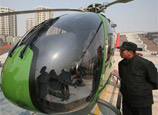
The Ministry of Health and Children's Hospital of Fudan University in Shanghai, are spearheading a three-year, 32-million yuan project to reveal the prevalence of autism in China and create universal protocols for screening and treatment.
The project is the country's first nation-wide survey of autism, and will give policymakers their clearest picture yet as to the stakes of the situation at hand.
"The goal is that in the next three years to not only train core group of individuals with high level of skills in terms of diagnosis and intervention, but also to deliver a public health statistic that would help guide them (China's government) in development and implementation of social policies," says Dr. Andy Shih, tvice president of Scientific Affairs at Autism Speaks, a US-based advocacy group that is advising on the project. "As part of this overall growth in autism research in China, this reflects the overall interest of the government agency, in terms of autism as a health priority, (and) a scientific priority."
The project is a three-tiered undertaking, coordinated between Children's Hospital of Fudan Univeristy and seven partner hospitals spanning the geographical berth of China, according to Wang Yi, the head of the hospital's neuroscience department, and the director of the project, which is funded by a 32-million-yuan grant from the Ministry of Health and has a deadline of 2015.
During the first phase, which will begin in July, and last four-to-six months, staff at the eight hospitals will be trained and a pilot survey will be carried out.
The second phase, an epidemiological study geared towards obtaining a true count of the rate of autism in China, will take at least one year. It involves a sample size of up to 200,000 geographically diverse middle school students, aged 6-12, Wang Yi says.

















 Experience death, reflect life: Girl stages her own fake funeral
Experience death, reflect life: Girl stages her own fake funeral


![]()
